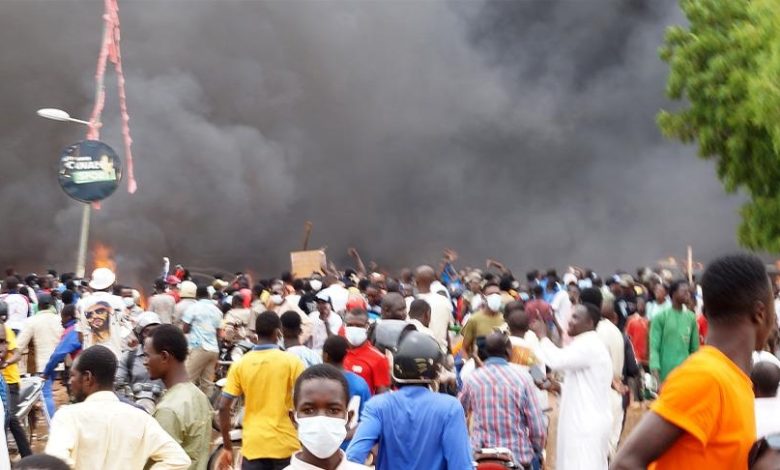Anticipation and Imminent Military Action… Niger Coup Faces Popular Rejection and Regional Outrage

The Niger coup faces popular rejection and regional outrage. The coup leaders in Niger are making efforts as they confront a looming deadline from their neighbors to relinquish power or face potential military action. The Economic Community of West African States (ECOWAS), the regional bloc of West African countries, gave the Nigerien military a deadline, which ended yesterday, to release ousted President Mohamed Bazoum and restore him to office.
An official from the group stated that a “plan” for intervention had been formulated, but it remained a last resort.
Imminent Military Action
As the clock ticks, the possibility of military action becomes a real concern. Niger is located in the heart of the Sahel region in Africa, which has witnessed numerous power seizures in recent years, including in Mali and Burkina Faso. However, Niger also stood as one of the few remaining democracies in the region.
The victory of President Mohamed Bazoum in the 2021 elections marked a relatively peaceful transition of power, following years of military coups that followed Niger’s independence from France in 1960. Nevertheless, signs emerged that the military leadership in Niger believed it lacked government support to combat militants and that the coup could change that trajectory. The coup began in late July with the arrest of elements of the presidential guard, leading to the closure of national institutions and protesters taking to the streets.
Abdulrahman Tianni, the new head of the guard, was appointed, and Bazoum’s whereabouts remained unclear. In a Washington Post opinion piece, Bazoum described himself as a “hostage.”
New Measures
The Economic Community of West African States expressed readiness to take action in cases where leaders refuse to relinquish power or when political crises escalate. African media reported that the Nigerian president had written to lawmakers, as required by law, to inform them of the Economic Community of West African States’ intention to intervene militarily in Niger if the coup leaders remained “defiant.” Senegal, a major player in the region, pledged to send forces, while France, Niger’s former colonial power, expressed support for the regional bloc’s position.
After a meeting of the Economic Community of West African States this week, the Commissioner for Political Affairs, Peace, and Security, Abdul Fatah Musa, described any military option as a “last resort.” However, he added that “all the elements that could enter into any final intervention have been put in place and are being refined.”
Extreme Alert Status
Oluwaseyi Adetayo, a security and intelligence expert, stated, “Preparations for an extreme alert status are already underway, and there is no doubt about it. The military is fully prepared.”
He further commented, “From my understanding, Nigeria will not back down and will do whatever it takes to restore civilian rule in Niger.”
He continued, “They want power to return to Bazoum, but that might not be a possible outcome. They might have to convince the military council to step down, but they won’t hand power over to Bazoum. They will lose, and Bazoum will lose too. A neutral figure might come in to manage a transitional government.”
Mali and Burkina Faso, both led by soldiers who forcefully took power, stated that any military intervention would be considered an act of war. The new military leader in Niger, General Abdulrahman Chianni, requested support from Mali, but Mali’s military capabilities have significantly diminished after the French army’s departure and United Nations soldiers’ request to leave the country following a decade-long peacekeeping mission.
Experts say that Mali and Burkina Faso have limited capacity to deploy a significant number of forces to Niger. With American and French forces present in the country, concerns of a possible proxy war have emerged.
The most prominent recent example was in 2017 when the Economic Community of West African States deployed military forces in Gambia to oust President Jammeh, who refused to relinquish power after elections. The show of force at the border led Jammeh to step down swiftly, raising questions about whether similar tactics would succeed in the current situation in Niger.
The bloc has also deployed peacekeeping forces, mainly from Nigeria, in conflict-ridden areas such as Sierra Leone and Liberia. However, this marks the first time it has threatened intervention in a coup. There has been no similar response to neighboring coup events in Mali or Burkina Faso.
Popular Rejection
The prevailing sentiment in Niger is one of rejection of the coup, although many Nigeriens are torn. The country has experienced multiple coups and dictatorships, but at the same time, misrule has tainted the idea that democracy is the solution. Niger is one of the poorest countries globally, with its people suffering from basic necessities such as food and shelter.
This kind of sentiment suggests that even if the stated goal is to restore democracy, military intervention might not be welcomed across the country.












